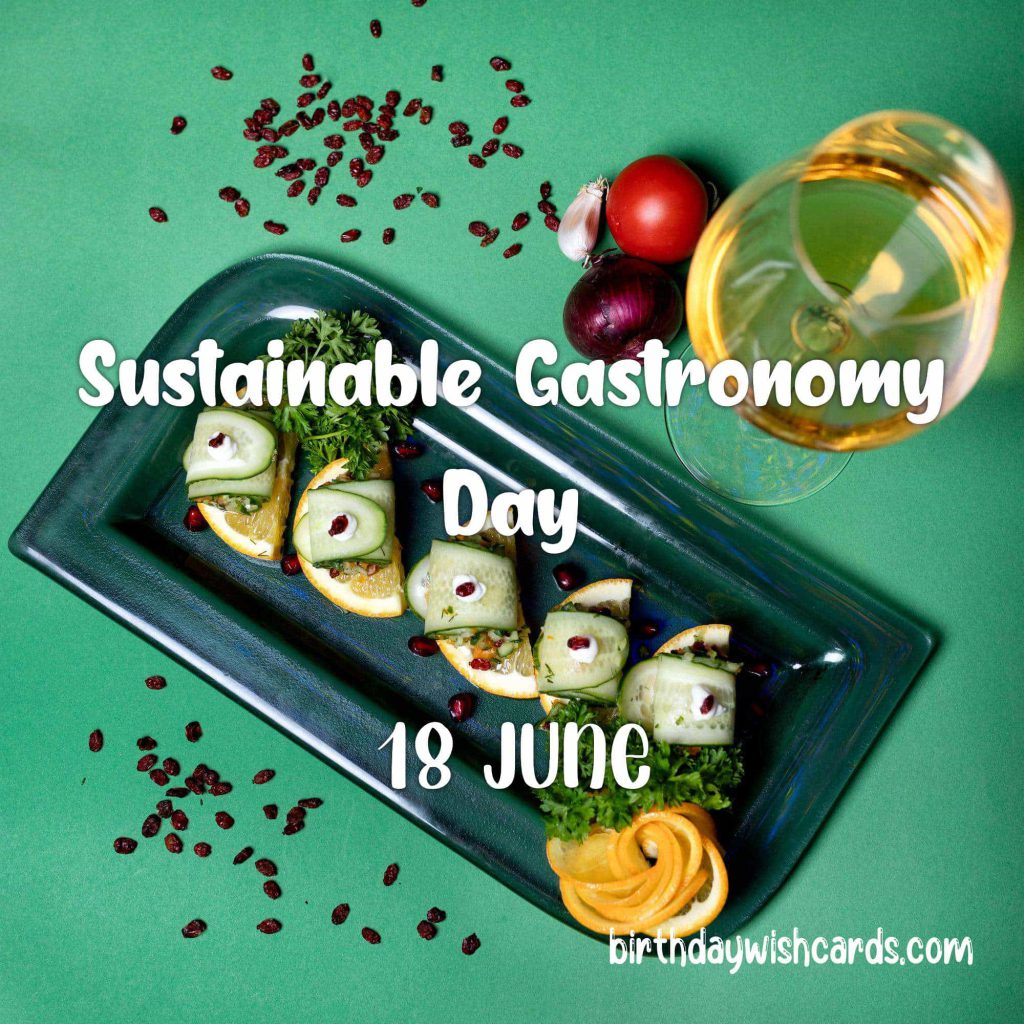
18 June: Sustainable Gastronomy Day – Celebrating the Art of Sustainable Food
Observed worldwide on 18 June, Sustainable Gastronomy Day shines a light on the vital role that sustainable gastronomy plays in our lives and our planet’s future. Established by the United Nations General Assembly in December 2016, this day encourages us to reflect on how the art of food can be harmonized with principles of sustainability.
What Is Sustainable Gastronomy?
Gastronomy is more than just the preparation and enjoyment of food—it is an exploration of culinary traditions, techniques, and the cultural significance of what we eat. Often, it highlights local cuisines and regional flavors that define communities around the world.
Sustainability, in this context, means using resources responsibly to ensure they remain available for future generations. Applied to food, it involves agricultural, fishing, and cooking practices that protect the environment and conserve natural resources.
Sustainable gastronomy brings these concepts together. It considers where ingredients come from, how they are grown or harvested, and the impact of their journey from farm or sea to table. This approach champions environmentally friendly practices, supports local economies, preserves biodiversity, and inspires healthy eating habits.
Why Is Sustainable Gastronomy Important?
The global food system faces significant challenges—climate change, biodiversity loss, soil degradation, and water scarcity among them. Food production is a leading contributor to greenhouse gas emissions, and unsustainable practices threaten both ecosystems and long-term food security.
Embracing sustainable gastronomy helps to:
- Reduce environmental impact: Choosing seasonal, local, and organic ingredients minimizes carbon footprints and helps protect ecosystems.
- Support local communities: Sourcing food from local farmers and producers strengthens economies and promotes social equity.
- Preserve biodiversity: Including diverse foods and traditional crops safeguards endangered species and genetic diversity.
- Promote health: Sustainable food choices are often more nutritious and less processed, supporting overall well-being.
How Can You Practice Sustainable Gastronomy?
Everyone can help advance sustainable gastronomy through simple, everyday actions:
- Choose seasonal and local ingredients: Eating foods in season and grown nearby reduces transportation emissions and supports local farmers.
- Reduce food waste: Plan meals, store food properly, and use leftovers creatively to minimize waste.
- Support organic and regenerative agriculture: Select products grown without harmful chemicals and prioritize farming methods that restore soil health.
- Eat more plant-based meals: Lowering meat consumption reduces environmental impact, as livestock farming is resource-intensive.
- Preserve traditional recipes: Celebrate cultural heritage by cooking and sharing dishes that use local, sustainable ingredients.
- Educate yourself and others: Learn about the origins of your food and help raise awareness about sustainable gastronomy.
Global Recognition and Impact
The United Nations’ recognition of Sustainable Gastronomy Day aims to raise global awareness about the importance of sustainable food systems. It encourages collaboration among governments, food producers, chefs, and consumers to achieve the Sustainable Development Goals (SDGs), particularly those related to zero hunger, good health, responsible consumption, and climate action.
On 18 June, events such as food festivals, workshops, cooking demonstrations, and educational campaigns highlight sustainable practices. These initiatives foster a global movement that respects the environment, celebrates cultural diversity, and promotes healthy diets.
The Role of Chefs and Food Professionals
Chefs and food professionals are at the forefront of promoting sustainable gastronomy. By sourcing ingredients responsibly and designing menus that reflect sustainability, they influence consumer choices and set industry standards. Many renowned chefs advocate for ethical food systems, partnering with farmers and communities to advance sustainable practices.
Culinary schools are also integrating sustainability into their curricula, preparing the next generation of chefs to consider the environmental and social impact of their work.
Sustainable Gastronomy and Cultural Heritage
Sustainable gastronomy is deeply intertwined with preserving cultural heritage. Traditional food practices often emphasize respect for natural cycles, the use of indigenous ingredients, and minimal waste. Valuing these traditions helps protect cultural identities and fosters diversity in the global food landscape.
This approach also encourages the revival of ancient grains, heirloom vegetables, and traditional cooking techniques, which contribute to food security and environmental resilience.
Challenges and Opportunities
Despite its many benefits, sustainable gastronomy faces challenges such as economic pressures, limited consumer awareness, and restricted access to sustainable products. Overcoming these barriers requires collaboration among policymakers, businesses, educators, and individuals.
At the same time, sustainable gastronomy offers exciting opportunities: innovation in food technology, new markets for sustainable products, and greater community engagement in food systems.
Conclusion
Sustainable Gastronomy Day on 18 June is a powerful reminder of the impact our food choices have on the world. By embracing sustainable gastronomy, we honor the art of cooking and eating while protecting the planet, supporting communities, and enhancing our health.
Each of us can contribute to this global movement by making thoughtful food choices, supporting local producers, and sharing knowledge about sustainability. Together, we can ensure that the joy and richness of gastronomy endure for generations to come.




 Explore the Vibrant and Colorful International Carnival of Victoria – An Epitome of Entertainment
Explore the Vibrant and Colorful International Carnival of Victoria – An Epitome of Entertainment




